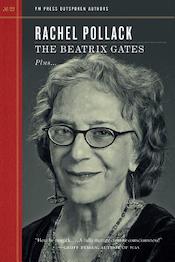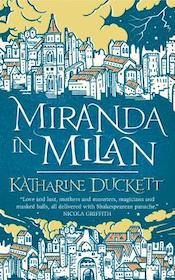The Future Alternative Past: Gender is a binary: yes or no?
Every month, Nisi Shawl presents us with news and updates from her perch overlooking the world of science-fiction, fantasy, and horror. You can also look through the archives of the column.
SFFH (science fiction, fantasy, and horror) is a verbal vat boiling over with possible ways of complicating gender categories. The genre even gives out a literary award for doing so — the Tiptree, which is named after James Tiptree, Jr. (70s author Alice Sheldon’s penname).
Foremost among SFFH’s early gender-role questioners is Samuel R. Delany, an out gay black man. In Delany’s 1976 novel Trouble on Triton: An Ambiguous Heterotopia, citizens of Neptune’s moon switch up the physical manifestations of their gender at will. That Bron, the book’s whiny and unreliable narrator, tries to use this gift to manipulate others into satisfying his desires against their druthers is a source of drama, not an authorial condemnation of the practice. If that isn’t obvious to anyone on reading it, interviews with Delany and his literary track record would back the assertion up. After all, in his first short story, “Aye, and Gomorrah,” Delany arguably anticipated another area of divergence from assigned norms — this time the related norms of sexual orientation — with his depiction of the asexual “Spacers.”
As a Delany disciple, I’ve done my writerly best to represent the fluidity of gender in my own work as well — particularly in my cyberpunk Making Amends stories. In “Deep End” and “The Mighty Phin,” a prisoner is forced to present as a man in cyberspace and denied access to inhabiting a female body. “In Colors Everywhere” takes place on a colony world where gender self assignment is a regular matter of course, from childhood on. And in my fantasy “She Tore,” one of Wendy Darling’s lovers is the shape-and-gender-shifting Tiger Lily.
Four Roads Cross, part of Max Gladstone’s wonderful Craft Sequence, also features gender expression made corporeal via magic. The enchantment responsible for this isn’t the novel’s point — just a milestone in the main character’s career.
That takes care of science fiction and fantasy, and I don’t have any ready examples of horror along these lines. Doesn’t it seem unlikely, though, that fiction which rejects rigid gender assignments would fit easily into such subgenre pigeonholes? Yoon Ha Lee’s Ninefox Gambit, for instance, first book in his Machineries of Empire series, reads a lot like military SF — rocket ships, rank, weapons of planet-wide destruction — yet there’s a distinctly supernatural element to it, too. Nebula winner All the Birds in the Sky by Charlie Jane Anders is both science fiction and fantasy. Though Gambit implants the consciousness of a long dead man in a woman’s body, Birds leaves gender alone. But both authors are trans, and thus familiar with the boundaries of gender identity and their permeability.
Source and content; subject and background. There’s so much to take into account. So much more than the possibility of subversion of current definitions to investigate. Where should you start? Later in this column I review the most recent book by Rachel Pollack, who like Delany is a genderfloomping veteran. Maybe there. Or if you prefer beginning with newer challengers of the status quo, check out GlitterShip, an audio magazine/podcast of SFFH by lesbian, gay, bisexual, trans, and queer authors where you’ll find choice stories representing gender in all its fascinating and seemingly endless configurations.
Recent books recently read

Latest in Terry Bisson’s audacious Outspoken Authors series, The Beatrix Gates (PM Press) showcases three Rachel Pollack stories and one essay she wrote exclusively for this book, plus a playful yet revealing interview. Way back in 1971 Pollack “transitioned” (a word she notes didn’t exist at the time) to public acknowledgement of her female identity. With firm grace and poetic candor she confronts changes in language, the ungraspableness of life’s divinity, and the aching hunger we all feel to receive the twin blessings of comprehension and acceptance.
Though slim, this is an expansive volume, a collection of stories burning to be told, yearning beautifully to be read. The mythic straightforwardness of “The Woman Who Didn’t Come Back” and “Burning Beard” perfectly set off the meta-leveled delicacy of the title story, the cult classic “The Beatrix Gates,” which contains a confessional, a fairytale, and a quantum-based far-future extrapolation of the science of self-transformation. Pollack’s comics and tarot-related writings aren’t included in this book, but they’re alluded to in the interview and listed in Bisson’s Pollack bibliography. All serve to illustrate how far the author has traveled and how far she’s willing to help us go.

Miranda in Milan (Tor), debut author Katherine Duckett’s queer sequel to William Shakespeare’s play The Tempest, makes of the formerly exiled sorcerer Prospero’s daughter a heroine, and of Prospero himself a power-mad villain. Abandoned by her fiancé Fernando and shunned by Milanese courtiers as a too-vivid reminder of her zombie mother, Miranda seeks refuge in the ducal palace’s secret passages and solace in the arms of her Moorish maidservant, Dorothea. While rooting for the blossoming of their secret lesbian love, I longed in vain for Duckett’s accounts of many of the adventures that fed and watered it.
Couple of upcoming cons
For the third year running I’m recommending that you attend WisCon, a feminist science fiction convention happening in Madison, Wisconsin. Is anyone out there listening to me? Then go. These days no con is without its shenanigans, but WisCon consistently attempts to address its problematic issues and gives voice to those disagreeing with how they’re dealt with. And though my mother won’t be attending this year — she died six-and-a-half months ago — a memorial panel will honor her late-blooming participation in this annual celebration of nonhegemonic fun.
If nonhegemonic fun is what you’re looking for, Balticon is your next best bet. But it’s the same weekend as WisCon, so you’re going to have to pick one or the other. In addition to the requisite panels, gaming, masquerade, art show, and dealer’s room, Balticon offers the three-hour Balticon Short Film Festival and the Compton Crook Award ceremony.Maybe base your decision on airfare? Or maybe on the Guest of Honor line-ups? WisCon’s G. Willow Wilson and Charlie Jane Anders arm-wrestling Balticon’s Elizabeth Bear, Scott Lynch, and Charles Vess — such a tough call.